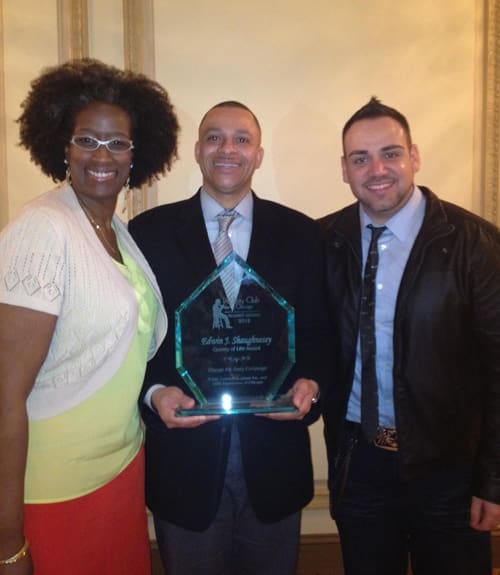 CountyCare, an Illinois Medicaid waiver program for adult residents in Cook County, has been accepting applications since November 2012—a full year before the implementation of the Affordable Care Act (ACA). But now that the ACA is in full swing, what will happen to CountyCare? More specifically, what’s at stake for people with HIV/AIDS during this time?
CountyCare, an Illinois Medicaid waiver program for adult residents in Cook County, has been accepting applications since November 2012—a full year before the implementation of the Affordable Care Act (ACA). But now that the ACA is in full swing, what will happen to CountyCare? More specifically, what’s at stake for people with HIV/AIDS during this time?
To address these and other questions, Inside Story sat down with Steven Glass, Executive Director, Managed Care at Cook County Health and Hospitals System (CCHHS), and Dave Barker, MD, Chief Medical Officer at the CCHHS Ruth M. Rothstein CORE Center.
Inside Story: So let’s start with a big question: What will happen to CountyCare after January 1, 2014?
Steven Glass: On January 1, CountyCare will transition from a Medicaid waiver program with coverage continuing under the ACA. Illinois Medicaid will cover the same people now covered under CountyCare, with the same eligibility criteria. CountyCare will become a Managed Care Community Network on January 1. MCCN is an Illinois mechanism allowing for the creation of managed care organizations under Illinois’ Department of Healthcare and Family Services, not the Department of Insurance. CountyCare has planned for this type of transition all along and we expect it to be seamless for our members and providers, without any breaks in coverage or care.
IS: So CountyCare will become a plan that people can choose, just like they will be able to choose a commercial Medicaid managed care plan?
 SG: Yes, that’s correct, once the commercial Medicaid plans are able to enroll the newly eligible population. Until then, the individual’s only other choice is fee-for-service.
SG: Yes, that’s correct, once the commercial Medicaid plans are able to enroll the newly eligible population. Until then, the individual’s only other choice is fee-for-service.
IS: Does someone enrolled in CountyCare now need to reapply for regular Medicaid to be covered starting in January?
SG: No, they do not need to reapply. They will stay with CountyCare and be automatically moved over to the new Medicaid adult coverage group created under the ACA. They will be able to contact the state’s client enrollment broker to switch to fee-for-service Medicaid, but we hope they will remain with their provider and with CountyCare.
IS: For someone who is enrolled in CountyCare now, will anything change on January 1?
SG: Nothing will change for people already in CountyCare.
IS: Is it correct that people who sign up now for expanded Medicaid with coverage beginning January 1, 2014, will be able to choose between CountyCare and regular fee-for-service Medicaid?
SG: Yes, that’s correct. People initially will have a choice between CountyCare and regular fee-for-service Medicaid. However, the state will require many people with HIV to enroll in some form of managed care in 2014. CountyCare will be one of those choices. However, people who enroll in CountyCare today through one of our Application Assistors, will not have to wait until January 1st for coverage. If deemed eligible, their coverage would start now.
IS: Can people still enroll directly in CountyCare now that ACA open enrollment has started?
SG: Yes, people can enroll in CountyCare directly through March 31, 2014, by calling our hotline at 312-864-8200.
IS: Why should people with HIV choose CountyCare over one of the other Medicaid options that will be available, like care coordination entities or commercial HMOs? In other words, what makes CountyCare better or different?
 Dr. Barker: Here is what we tell our patients at the Ruth M. Rothstein CORE Center:
Dr. Barker: Here is what we tell our patients at the Ruth M. Rothstein CORE Center:
• Easy Sign Up – only need to renew once per year
• No copays for medications
• No four-drug limit on non-HIV medications
• You can keep your CORE Center providers
• You can use the pharmacy of your choice, including neighborhood pharmacies, or mail order pharmacies such as CVS Procare or Walgreens C & M
SG: Specific to people with HIV, CountyCare has the most comprehensive access to HIV/AIDS treatment in the region. Virtually all of the established Ryan White-funded providers of primary and specialty care are also contracted by CountyCare. No other Medicaid-funded health plan or care coordination entity can make this claim. In addition, CountyCare and the AIDS Foundation of Chicago have worked in partnership to ensure no service is lost when someone obtains CountyCare coverage. Early on, we jointly developed a cross-walk of services showing the complementary nature of Ryan White-funded programs and CountyCare benefits that became a tool for joint advocacy on the need to allow both programs to run in tandem with each other.
IS: Can you talk about the partnership between CountyCare and the CORE Center?
DB: CORE, as a CCHHS facility is fully integrated with CountyCare. HIV positive patients enrolled in CountyCare can select CORE Center as their Primary Care Medical Home, and do not need to worry that their plan will drop CORE as a network provider. CORE is also able to accept specialty HIV referrals for CountyCare members from non-CCHHS providers where it has capacity, including HIV OB/Gyne and HIV Hematology to name a few. Community providers should contact CORE at 312-572-4500 prior to making a referral to ensure capacity to provide care. In addition to CountyCare, CORE accepts patients with or without insurance, who reside in the nine Northeastern counties of Illinois.
IS: How many people are enrolled in CountyCare?
SG: Since November 2011, we have initiated over 118,000 applications, submitting 82,000 of them to the State for adjudication. We have an approval rate between 85 and 90 percent.
IS: Where can people go to learn more about CountyCare?
SG: Call 312-864-8200 or visit our web page at: www.countycare.com.
To qualify, there are only a few criteria. You must:
• Live in Cook County, Illinois
• Be between 19 and 64 years old
• Be a legal immigrant for at least five years or be a U.S. citizen
• Meet income limits ($15,282 of income per year for an individual or $20,628 for a couple)
• Have a Social Security Number or have applied for one


